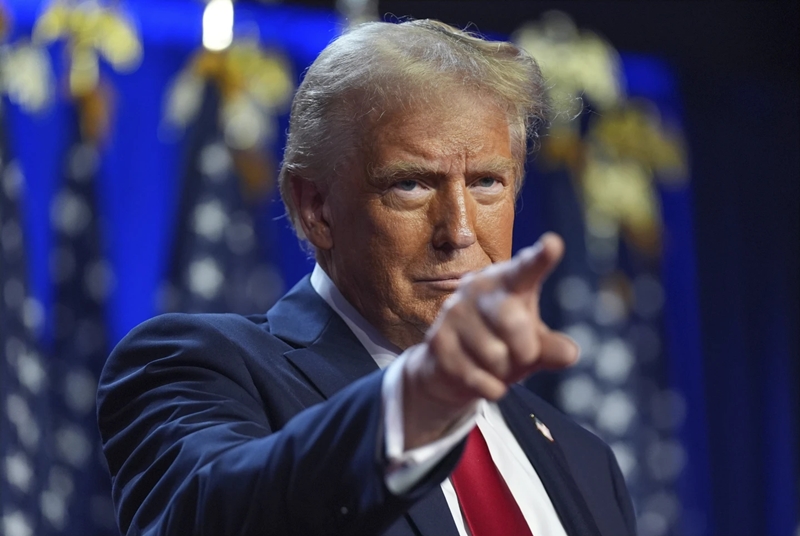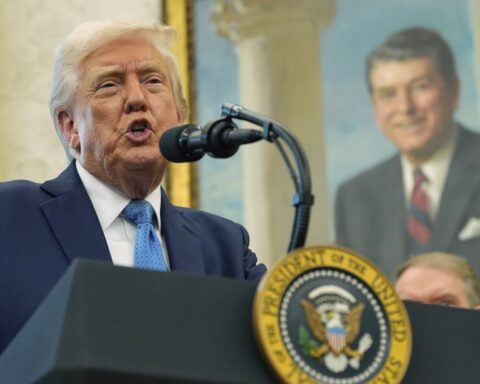PALM BEACH, Florida, Nov 6 (Reuters) – Donald Trump was elected president, capping a remarkable comeback four years after he was voted out of the White House and ushering in a new American leadership likely to test democratic institutions at home and relations abroad.
Trump, 78, recaptured the White House on Wednesday by securing more than the 270 Electoral College votes needed to win the presidency, Edison Research projected, following a campaign of dark rhetoric that deepened the polarization in the country.
The former president’s victory in the swing state of Wisconsin pushed him over the threshold.
“America has given us an unprecedented and powerful mandate,” Trump said early on Wednesday to a roaring crowd of supporters at the Palm Beach County Convention Center in Florida.
Trump’s political career had appeared to be over after his false claims of election fraud led a mob of supporters to storm the U.S. Capitol on Jan. 6, 2021, in a failed bid to overturn his 2020 defeat.
But he swept away challengers inside his Republican Party and then beat Democratic candidate Kamala Harris by capitalizing on voter concerns about high prices and what Trump claimed, without evidence, was a rise in crime due to illegal immigration.
Harris did not speak to supporters who had gathered at her alma mater Howard University. Her campaign co-chair, Cedric Richmond, briefly addressed the crowd after midnight, saying Harris would speak publicly later on Wednesday.
“We still have votes to count,” he said.
Republicans won a U.S. Senate majority, but neither party appeared to have an edge in the fight for control of the House of Representatives where Republicans currently hold a narrow majority.
JOBS AND ECONOMY
Voters identified jobs and the economy as the country’s most pressing problem, according to Reuters/Ipsos opinion polls. Many Americans remained frustrated by higher prices even amid record-high stock markets, fast-growing wages and low unemployment. With the administration of President Joe Biden taking much of the blame, a majority of voters said they trusted Trump more than Harris to address the issue.
Hispanics, traditionally Democratic voters, and lower-income households hit hardest by inflation helped fuel Trump’s election victory. His loyal base of rural, white and non-college educated voters again showed up in force.
Trump prevailed despite persistently low approval ratings. Impeached twice, he has been criminally indicted four times and found civilly liable for sexual abuse and defamation. In May, Trump was convicted by a New York jury of falsifying business records to cover up hush money payments to a porn star.
His victory will have major implications for U.S. trade and climate change policies, the war in Ukraine, Americans’ taxes and immigration.
His tariff proposals could spark a fiercer trade war with China and U.S. allies, while his pledges to reduce corporate taxes and implement a spate of new cuts could balloon U.S. debt, economists say.
Trump has promised to launch a mass deportation campaign targeting immigrants in the country illegally.
He has said he wants the authority to fire civil servants he views as disloyal. His opponents fear he will turn the Justice Department and other federal law enforcement agencies into political weapons to investigate perceived enemies.
A second Trump presidency could drive a bigger wedge between Democrats and Republicans on issues such as race, gender, what and how children are taught, and reproductive rights.
HARRIS FALLS SHORT
Vice President Harris fell short in her 15-week sprint as a candidate, failing to galvanize enough support to defeat Trump, who occupied the White House from 2017-2021, or to allay voters’ concerns about the economy and immigration.
Harris had warned that Trump wanted unchecked presidential power and posed a danger to democracy.
Nearly three-quarters of voters say American democracy is under threat, according to Edison Research exit polls, underscoring the polarization in a nation where divisions have only grown starker during a fiercely competitive race.
Trump ran a campaign characterized by apocalyptic language. He called the United States a “garbage can” for immigrants, pledged to save the economy from “obliteration” and cast some rivals as the “enemy within.”
His diatribes were often aimed at migrants, who he said were “poisoning the blood of the country,” or Harris, whom he frequently derided as unintelligent.
Despite legal woes and controversies, Trump is only the second former president to win a second term after leaving the White House. The first was Grover Cleveland, who served two four-year terms starting in 1885 and 1893.
UNPRECEDENTED CAMPAIGN
In May, Trump was convicted by a New York jury of falsifying business records to cover up hush money payments to a porn star. Two months later, a would-be assassin’s bullet grazed his right ear during a campaign rally, exacerbating fears about political violence. Another assassination attempt was thwarted in September at his Florida golf course. Trump blamed both attempts on what he claimed was the heated rhetoric of Democrats including Harris.
Barely eight days after the July shooting, Biden, 81, dropped out of the race, finally bowing to weeks of pressure from his fellow Democrats after a poor performance during his debate with Trump called into question his mental acuity and the viability of his reelection bid.
Biden’s decision to step aside turned the contest into a sprint, as Harris raced to mount her own campaign in a matter of weeks, rather than the typical months. Her rise to the top of the ticket reenergized despondent Democrats, and she raised more than $1 billion in less than three months while erasing what had been a solid Trump lead in opinion polls.
Harris’ financial advantage was partly countered by the intervention of the world’s richest man, Elon Musk, who poured more than $100 million into a super PAC mobilizing Trump voters and used his social media site X to amplify pro-Trump messaging.
As the campaign drew to a close, Harris increasingly focused on warning Americans about the perils of reelecting Trump and offered an olive branch to disaffected Republicans.
She highlighted remarks from several former Trump officials, including his former chief of staff and retired Marine Corps General John Kelly, who described Trump as a “fascist.”
Trump’s victory will broaden the fissures in American society, given his false claims of election fraud, anti-immigrant rhetoric and demonization of his political opponents, said Alan Abramowitz, a political science professor at Emory University who studies voter behavior and party politics.
A TRUMP SECOND TERM
Trump has vowed to reshape the executive branch, including firing civil servants he views as disloyal and using federal law enforcement agencies to investigate his political enemies, violating what has been a longstanding policy of keeping such agencies independent.
During his first term, Trump’s most extreme demands were sometimes stymied by his own cabinet members, most notably when Vice President Mike Pence refused to block Congress from accepting the 2020 election results.
Once the 2024 vote is certified by Congress on Jan. 6, Trump and his vice president, U.S. Senator JD Vance, are due to take office on Inauguration Day, Jan. 20. Throughout his two-year-long campaign, Trump has signaled he will prioritize personal fealty in staffing his administration. He promised roles in his administration to Musk and former presidential candidate Robert F. Kennedy Jr., both avid supporters.





